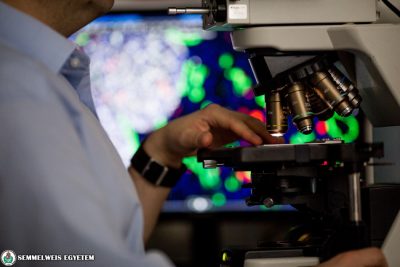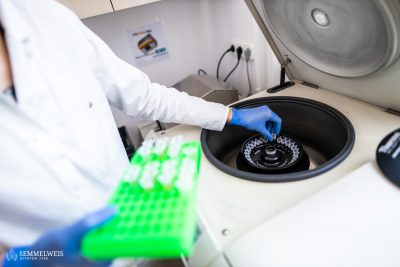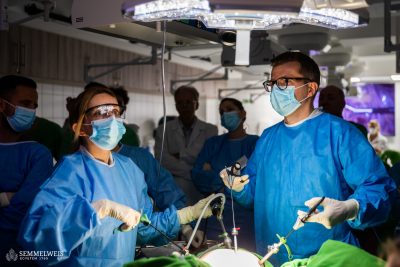Semmelweis University has won more than HUF 1.7 billion in funding under the Thematic Area Excellence Program of the Ministry of Innovation and Technology (ITM). At a press conference on the occasion, innovation and technology minister Dr. László Palkovics talked about the details of the program and rector Dr. Béla Merkely said that the most important aspect of the research to be financed by the program is for them to be utilized as soon as possible in clinical practice, in the treatment of patients.
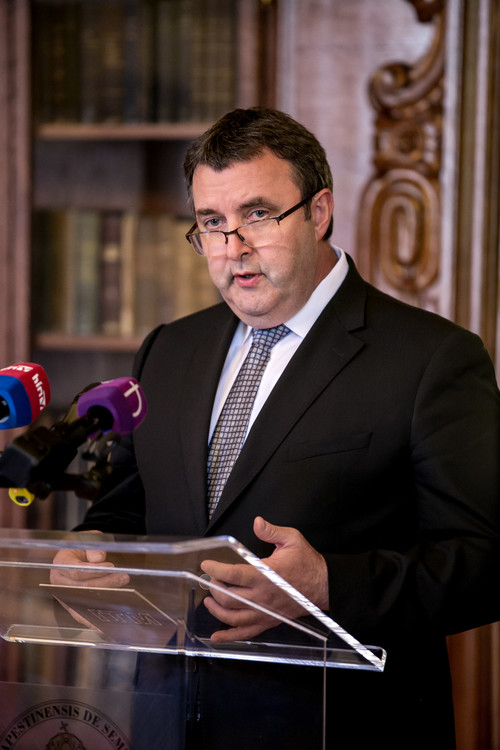 Under the framework of the 2019 Thematic Area Excellence Program, 55 thematic areas of 26 university and state research institutes have been awarded a total of HUF 14.6 billion in funding, announced Minister of Innovation and Technology Dr. László Palkovics in the Semmelweis Salon. He pointed out that, in line with the EU funding system, the announced programs have three pillars. The first is ‘excellence funding’ for the most outstanding researchers, the second is excellence funding based on thematic areas, and the third is the area of innovations, i.e. product development. He added that the government recently decided on increasing funding for research, development and innovation by HUF 32 billion, which means a total of HUF 162 billion will be spent on this area in 2020.
Under the framework of the 2019 Thematic Area Excellence Program, 55 thematic areas of 26 university and state research institutes have been awarded a total of HUF 14.6 billion in funding, announced Minister of Innovation and Technology Dr. László Palkovics in the Semmelweis Salon. He pointed out that, in line with the EU funding system, the announced programs have three pillars. The first is ‘excellence funding’ for the most outstanding researchers, the second is excellence funding based on thematic areas, and the third is the area of innovations, i.e. product development. He added that the government recently decided on increasing funding for research, development and innovation by HUF 32 billion, which means a total of HUF 162 billion will be spent on this area in 2020.
The objective of the Thematic Area Excellence Program is aligning the framework of research with social-economic challenges, strengthening focus on research-development and innovation, and boosting scientific productivity, said the minister. Of the four designated research areas – a safe society and environment; industry and digitalization; health; culture and family – the most funding was awarded to institutions conducting health-related research, within which Semmelweis University stood out, added Dr. László Palkovics.
 Rector Dr. Béla Merkely said that the leadership of Semmelweis University, which celebrates its 250th anniversary this year, has formulated three important objectives. One is that the Hungarian people receive the best medical, health, pharmacy and conductor services thanks to the professionals graduated from the university. Second, that Hungarian medical education be renewed with practical training more in focus, and third, that the university be ranked among the top 100 universities in the world, and among the top five medical universities in Europe within the next 10 years. These goals are served, among others, by the recent declaration of intent on establishing a Health Industry-Biotechnology Science Park, together with the Pázmány Péter Catholic University, the National University of Public Service, and the district of Józsefváros, the rector pointed out. The funds won now represent another step toward the establishment of the Science Park.
Rector Dr. Béla Merkely said that the leadership of Semmelweis University, which celebrates its 250th anniversary this year, has formulated three important objectives. One is that the Hungarian people receive the best medical, health, pharmacy and conductor services thanks to the professionals graduated from the university. Second, that Hungarian medical education be renewed with practical training more in focus, and third, that the university be ranked among the top 100 universities in the world, and among the top five medical universities in Europe within the next 10 years. These goals are served, among others, by the recent declaration of intent on establishing a Health Industry-Biotechnology Science Park, together with the Pázmány Péter Catholic University, the National University of Public Service, and the district of Józsefváros, the rector pointed out. The funds won now represent another step toward the establishment of the Science Park.
“During the course of applying for the funds, we concentrated on those segments of the health industry that play a key role today, where the university’s researchers already have experience, and that are priority from the aspect of future industry relations,” said rector Dr. Béla Merkely. He noted that the main pillars of the university’s application are bio-imaging, bionics, digital biomarkers and translational biotechnology; these are connected by the research and development of artificial intelligence. “The HUF 1.7 billion awarded to the university is a unique opportunity to become a dominant player in the region, as the development of the health industry, pharmaceuticals, biotechnology and medical equipment have a clear positive effect on the quality of training, and through it, the quality of treatment as well,” emphasized the rector of Semmelweis University.
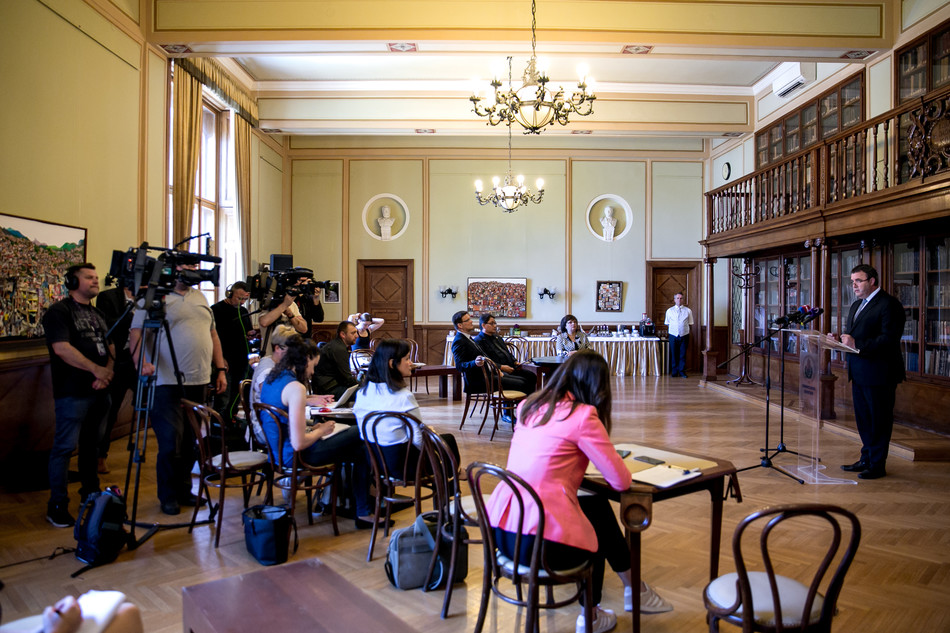 With the help of the funds awarded by the ministry, 11 translational sub-projects will be implemented at the university’s departments at three of its faculties. Standing out from among them are the projects dealing with early diagnosis of the main causes of death, such as the development of a nanoparticle contrast agent aiding the diagnostic imaging of the vascular system; developing the Artificial Intelligence-Based Cardiology Decision Support System and Digital Assistant; developing an algorithm that increases the efficiency of tumor therapy; subsequently developing an artificial intelligence-based system; and developing at the Health Services Management Training Center a system that optimizes patient paths.
With the help of the funds awarded by the ministry, 11 translational sub-projects will be implemented at the university’s departments at three of its faculties. Standing out from among them are the projects dealing with early diagnosis of the main causes of death, such as the development of a nanoparticle contrast agent aiding the diagnostic imaging of the vascular system; developing the Artificial Intelligence-Based Cardiology Decision Support System and Digital Assistant; developing an algorithm that increases the efficiency of tumor therapy; subsequently developing an artificial intelligence-based system; and developing at the Health Services Management Training Center a system that optimizes patient paths.
Dr. Béla Merkely stressed that the main objective of the research to be conducted is that they be utilized as soon as possible in clinical practice, in the treatment of patients.
Eszter Keresztes
Translation: Tamás Deme
Photo: Attila Kovács – Semmelweis University
